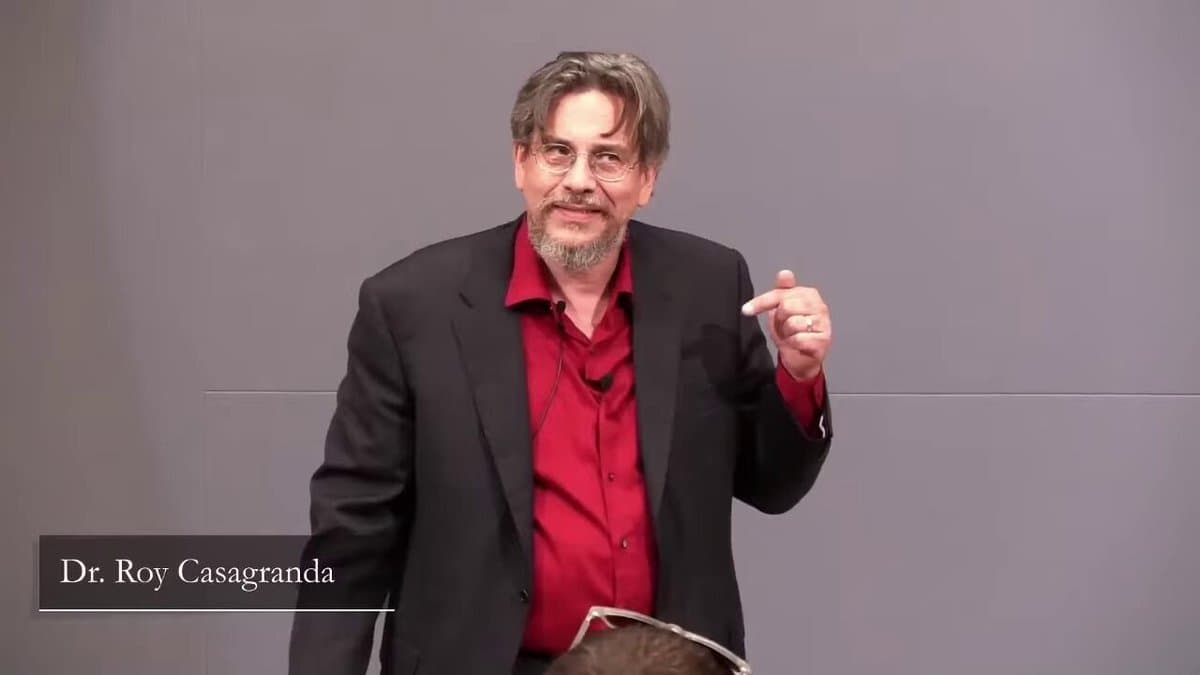
Creează-ți propria ta colecție
Salvează obiecte în propriile tale colecții
Urmărește obiectele
Marchează obiectele cu propriul status
Abonează-te
Primește actualizări când sunt adăugate obiecte noi
Aruncă un ochi și pe alte colecții care s-ar putea să-ți placă.
Sortează după
Dr. Roy Casagranda examines the extraordinary life and leadership of Toussaint Louverture during the Haitian Revolution — a story of vision, mercy, and betrayal. From the arrival of Columbus and the genocide of the Taino to the rise of Louverture and the fall of Napoleon’s colonial ambitions, this lecture reveals how Haiti became the first free Black republic in the modern world. Exploring themes of power, forgiveness, race, and empire, Dr. Casagranda exposes the moral and political lessons that still define the struggle for justice and freedom today.
The Islamic Golden Age is Dr. Roy's seventh lecture for the Museum of the Future's Lessons from the Past (2025). This collaboration between the Museum of the Future and Dr. Roy aims to explore 10 topics ranging from the life of the father of modern medicine to examples of great leadership to the birth of the Most Serene Republic of Venice. Why did the Islamic Golden Age happen — and why did knowledge not only survive but thrive? In this lecture, Dr. Roy Casagranda shows how ideas passed from Egypt, Mesopotamia, Greece, Rome, and Persia into the Arab empires, where they were protected, studied, and expanded. Unlike civilizations that allowed libraries to burn and wisdom to fade, the Abbasid world cultivated learning as a foundation of power and progress. Through compelling stories, Dr. Roy explains how scholars like Ibn al-Haytham and Ibn Sina advanced science and medicine, while the preservation of Plato and Aristotle ensured that ancient wisdom lived on to inspire the European Renaissance. This is a history of how cultures that valued knowledge carried it forward — and how that appreciation shaped the course of civilization.
In this episode of Office Hours, Dr. Roy Casagranda and Jeremy continue their deep dive into Palestine. After opening with updates on their new podcast and addressing a common audience question about a World War II lecture series, they turn to the history of Palestine — beginning with the Nakba of 1948, the creation of the Palestinian Liberation Organization (PLO), and the rise of factions such as Fatah and Hamas. Dr. Roy traces major turning points including the Suez Crisis of 1956, the Six-Day War of 1967, and Israel’s occupation of Palestinian territories. He explains how these policies have created conditions of apartheid, systemic inequality, and ongoing conflict in Gaza, the West Bank, and beyond. The lecture also explores the role of international powers, the formation of Hamas, the emergence of Hezbollah, and the broader dynamics shaping the Middle East today.
In this episode of Office Hours with Dr. Roy Casagranda, Roy and Jeremy take on one of the most difficult and important conversations of our time: the history of Palestine. Part 1 traces the story from ancient times through the creation of the state of Israel in 1948. Roy walks us through the roots of Jewish and Palestinian identity, the role of empires from Babylon to Rome, the Crusades, and the Arab conquest. We explore the rise of Zionism in Europe, centuries of antisemitism and pogroms, the Holocaust, and the global decisions that led to partition and displacement in Palestine. This is not just a history lesson — it’s a framework for understanding how the past still shapes the present. This is Part 1 of a multi-part series. Future episodes will examine the apartheid system, ongoing settlements, the genocide in Gaza, the daily realities faced by Palestinians today, and what can be done.
Dr. Roy Casagranda challenges the foundations of how we define “Western Civilization.” He traces the origins of government, writing, and religion in ancient Egypt and Mesopotamia, arguing that civilization predates writing and even agriculture. Roy also dismantles the artificial East–West divide, spotlighting Persia and the Islamic Golden Age as essential parts of Western history often erased from traditional narratives. With humor, insight, and rigor, he calls for a re-examination of the West’s origin story—and what it really means to be “Western.”
In this lecture Roy dives into the madness that is 2022 in a desperate bid to understand the major events that led to the moronic choices that brought us to the series of awful years known as the 21st century. Previously titled: "Why Did Someone Think This Was a Good Destination (Part 2: From Poland to Reagan)"
In this lecture Dr. Casagranda attempts to thread together the unraveling of the liberal project in the US and its replacement by a far right movement. He has committed to making this Part 3: How the Baby Boomers and the Silent Generation made one awful choice after the other. Previously titled: "Why Did Someone Think This Was a Good Destination (Part 3: The Promotion of Unfettered Greed)"
In Part 4 or his 3-part series, Dr. Roy Casagranda returns to the 1970s to trace forward the nuclear disasters of 1979 and 1986 and how they are eerily similar. Then dives into the growing collective madness of the last quarter century. Previously titled: "Why Did Someone Think This Was a Good Destination? (Part 4: Radiation and Madness)"
Dr. Roy Casagranda pushes back against the artificial East-West paradigm and show how the so-called "Dark Ages" was in fact a period with enormous intellectual achievement. After laying out the contradictions within the construct of the paradigm of western civilization, Dr. Casagranda examines how Muslim Persian, and Jewish, Christian, and Muslim Arab philosophers preserved and advanced Western civilization while Europe wallowed in the Medieval.